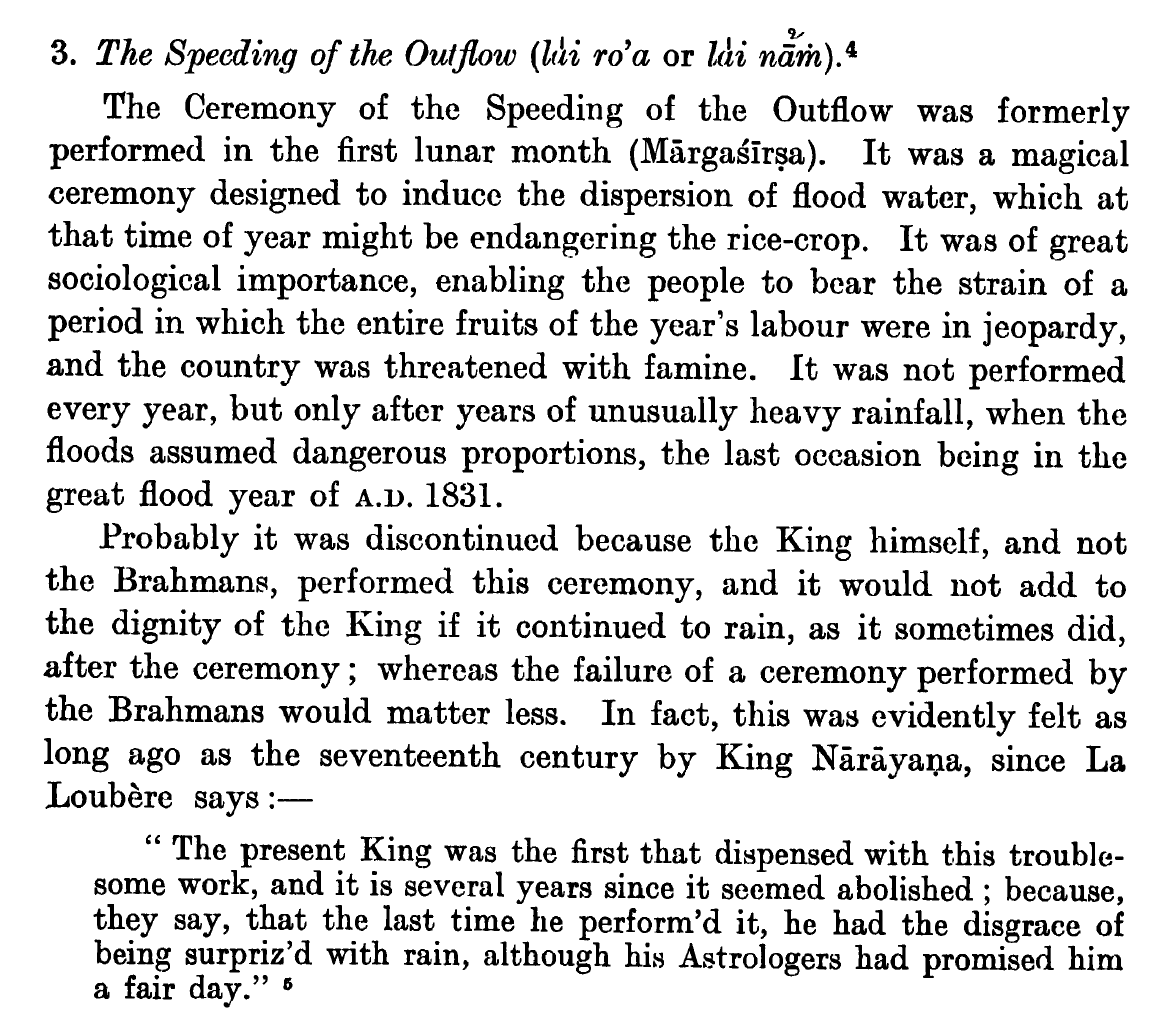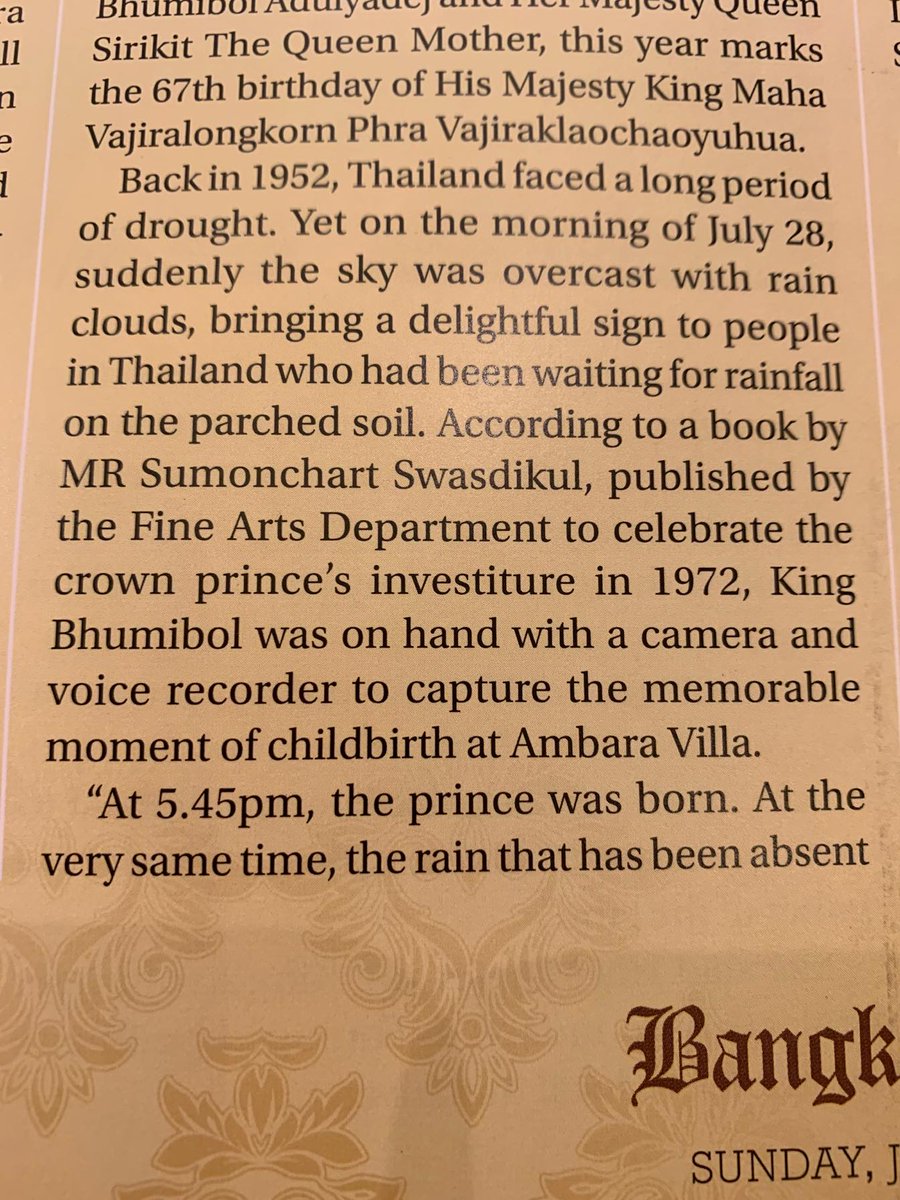Happy birthday to King Vajiralongkorn of Thailand who is 67 years old today!




Andrew MacGregor Marshallบัญชีตัวจริง @zenjournalist 2 ชั่วโมงที่ผ่านมา
** A quick thread on mysticism, water and the Thai monarchy, on King Vajiralongkorn's birthday today. 1/13
** Water has a very important role in Thai royal mythology. Thailand's
monarchy still draws on primitive beliefs from hundreds of years ago,
when kings claimed mystical power to control the weather and ensure a
good rice harvest. 2/13
** In the former Thai kingdom of Ayutthaya, and in the early Bangkok
kingdom, some of the main royal ceremonies every year involved the king
symbolically asking for rain, and then banishing the waters at the end
of the rainy season. 3/13
** Here is what British scholar HW Quaritch Wales wrote about the
water-banishing ceremony in his 1931 book Siamese State Ceremonies. 4/13

** During the reign of King Bhumibol, he continued the myth, with the
reintroduction of the Royal Ploughing Ceremony, and his false claims to
have pioneered cloud seeding to induce rain. In fact, the technique was
invented elsewhere and is not particularly effective. 5/13
** In his final years, when he was mostly unconscious, Bhumibol was
sometimes wheeled out of Siriaj Hospital to the side of the Chao Phraya
River, where he sat silently in his wheelchair. Palace officials claimed
he was monitoring the water level. http://www.khaosodenglish.com/life/2015/04/24/1429877363/ … 6/13
King Bhumibol viewing the Chao Praya river from Royal Thai Navy's auditorium building, 24 April 2015.
** The article on King Vajiralongkorn in today's Bangkok Post also promotes the myth of mystical royal control of the rain.
It says that at the moment Vajiralongkorn was born in 1952, a long drought came to an end as it suddenly began to rain. 7/13

** It quotes from a book by minor aristocrat Sumonchart Swasdikul: "At
5.45pm, the prince was born. At the very same time, the rain that has
been absent throughout the season started to come down. It was as if the
sky recognised his birth." https://www.bangkokpost.com/life/social-and-lifestyle/1720343/born-to-be-a-king … 8/13

Since the reign of King Rama I, the Chakri Dynasty has had an unbroken
line of 10 great monarchs culminating in His Majesty King Maha
Vajiralongkorn Phra Vajiraklaochaoyuhua
The images of His Majesty King Maha Vajiralongkorn Phra
Vajiraklaochaoyuhua, in full regalia, sitting on the Budtan Thong royal
palanquin as he was carried for a historic procession around the Grand
Palace during the coronation ceremony in May are still etched deeply in
the minds of all Thai citizens, here and afar.
ng's Mead School in Sussex and
As the historic ceremonies that culminated in his coronation took
place, His Majesty the King -- the 10th in the Chakri Dynasty -- has
vowed to "carry on, preserve, develop and reign with righteousness for
the benefit and happiness of the people". Those words cut through the
heart of all Thais who admired his commitment to continue what his
father -- the late King Bhumibol Adulyadej -- had created.
Born on July 28, 1952, as the only son of King Bhumibol Adulyadej and Her Majesty Queen Sirikit The Queen Mother, this year marks the 67th birthday of His Majesty King Maha Vajiralongkorn Phra Vajiraklaochaoyuhua.
Back in 1952, Thailand faced a long period of drought. Yet on the morning of July 28, suddenly the sky was overcast with rain clouds, bringing a delightful sign to people in Thailand who had been waiting for rainfall on the parched soil. According to a book by MR Sumonchart Swasdikul, published by the Fine Arts Department to celebrate the crown prince's investiture in 1972, King Bhumibol was on hand with a camera and voice recorder to capture the memorable moment of childbirth at Ambara Villa.
"At 5.45pm, the prince was born. At the very same time, the rain that has been absent throughout the season started to come down. It was as if the sky recognised his birth," MR Sumonchart wrote.
The little prince started his early education at the age of four at Chitralada School in the Dusit Palace, before furthering his elementary studies in the United Kingdom at King's Mead School in Sussex and completing his secondary education at Millfield School in Somerset.
After he turned 20 in 1972, the young man was proclaimed Crown Prince, the third for the Chakri Dynasty, in December amid the pomp and pageantry of a centuries-old tradition at the Ananta Samakhom Throne Hall. As he aged, the Crown Prince never ceased to involve himself in improving the country's public health, agriculture and education, like his late father. Many times he was seen accompanying King Bhumibol Adulyadej to Thailand's remote areas to provide his people with much-needed aid. A number of projects have been established under his royal guidance to help Thais in several areas such as promoting appropriate rice farming methods, setting up a mobile agricultural clinic and founding the Somdet Phra Yuparaj Hospital project, to name only a few.
On Dec 1, 2016 -- two months after the passing of King Bhumibol Adulyadej -- His Majesty the King accepted an invitation from the National Legislative Assembly to ascend the throne.
Prior to his royal coronation in May, His Majesty the King married Gen Suthida Vajiralongkorn Na Ayutthaya, after which the King issued a royal command installing her as Queen Suthida, and accorded her royal rank and status.

Kornrawee Sitthichiwapak, the MD's deputy director-general, said downpours this rainy season were far below average, particularly in the North and Northeastern as well as in the Central Plains -- all of which are important crop growing regions.
"The country's overall rainfall is the lowest in a decade," she said.
Ms Kornrawee said this season's storms -- including Tropical Storm Mun -- were much less powerful than in previous seasons, bringing much less rain to the interior part of the country.
"As such, farmers will have to wait until late August or early September for heavy rain to fall," she said.
The lack of rain has affected water reserves across the country.
Water levels in large reservoirs stood at about 38% in the North, 33% in the Northeast, 22% in the Central Plains, 35% in the East, 67% in the West, and 60% in the South, according to figures released by the ONWR.
The lack of heavy rain has seen four medium-sized reservoirs in Nakhon Ratchasima completely dry out, according to the 8th Royal Irrigation Office.
The empty reservoirs have prompted the Office of National Water Resources (ONWR) to speed up efforts to mitigate the impact of the looming drought.
Samroeng Saengphuwong, the deputy ONWR secretary-general, convened a meeting in Buri Ram -- attended by officials from Nakhon Ratchasima, Surin, Buri Ram, Si Sa Ket and Ubon Ratchathani -- to discuss the situation.
Officials also proposed measures to lessen the drought's impact on local residents.
"Prime Minister Prayut Chan-o-cha has instructed the ONWR and other related agencies about the importance of helping those already suffering from water shortages, who will be even more affected by the drought," said Mr Samroeng.
According to Mr Samroeng, the northeastern region has only 4.3 billion cubic metres of water reserves left in its dams and reservoirs, which equates to about 33% of its maximum capacity.
"Seven large dams in the region now have less than 30% of their maximum capacity," he said.
The drought is expected to affect 105 districts across 12 provinces -- namely Loei, Nong Bua Lam Phu, Kalasin, Yasothon, Chaiyaphum, Khon Kaen, Maha Sarakham, Roi Et, Buri Ram, Surin, Si Sa Ket and Nakhon Ratchasima.
Some provinces have already resorted to drastic measures to cope with water scarcity.
Buri Ram plans to pump water from an abandoned mine to produce tap water, Mr Samroeng said.
** So if Vajiralongkorn could end a drought in 1952 just by being born, how
come he can't do anything about the drought in 2019? 13/13
Born on July 28, 1952, as the only son of King Bhumibol Adulyadej and Her Majesty Queen Sirikit The Queen Mother, this year marks the 67th birthday of His Majesty King Maha Vajiralongkorn Phra Vajiraklaochaoyuhua.
Back in 1952, Thailand faced a long period of drought. Yet on the morning of July 28, suddenly the sky was overcast with rain clouds, bringing a delightful sign to people in Thailand who had been waiting for rainfall on the parched soil. According to a book by MR Sumonchart Swasdikul, published by the Fine Arts Department to celebrate the crown prince's investiture in 1972, King Bhumibol was on hand with a camera and voice recorder to capture the memorable moment of childbirth at Ambara Villa.
"At 5.45pm, the prince was born. At the very same time, the rain that has been absent throughout the season started to come down. It was as if the sky recognised his birth," MR Sumonchart wrote.
The little prince started his early education at the age of four at Chitralada School in the Dusit Palace, before furthering his elementary studies in the United Kingdom at King's Mead School in Sussex and completing his secondary education at Millfield School in Somerset.
After he turned 20 in 1972, the young man was proclaimed Crown Prince, the third for the Chakri Dynasty, in December amid the pomp and pageantry of a centuries-old tradition at the Ananta Samakhom Throne Hall. As he aged, the Crown Prince never ceased to involve himself in improving the country's public health, agriculture and education, like his late father. Many times he was seen accompanying King Bhumibol Adulyadej to Thailand's remote areas to provide his people with much-needed aid. A number of projects have been established under his royal guidance to help Thais in several areas such as promoting appropriate rice farming methods, setting up a mobile agricultural clinic and founding the Somdet Phra Yuparaj Hospital project, to name only a few.
On Dec 1, 2016 -- two months after the passing of King Bhumibol Adulyadej -- His Majesty the King accepted an invitation from the National Legislative Assembly to ascend the throne.
Prior to his royal coronation in May, His Majesty the King married Gen Suthida Vajiralongkorn Na Ayutthaya, after which the King issued a royal command installing her as Queen Suthida, and accorded her royal rank and status.
** Obviously, Thai monarchs can't really magically control the weather, and
it's embarrassing to see this kind of nonsense in the Bangkok Post,
which claims to be a serious newspaper. 9/13
** But also, claiming royal power over water is a dangerous game to play,
because it means that during times of severe drought or flooding, this
could be seen as a sign that the monarch is not worthy and is unable to
exercise his magical kingly powers. 10/13
** The Thai junta was so sensitive about the issue that they even censored
CNN weather reports in 2017, because they didn't want Thais to know how
bad the flooding was in the country. 11/13
** Earlier this month, the Bangkok Post reported that Thailand is facing
its worst drought in more than 10 years.
"The country's overall rainfall is the lowest in a decade," said
Kornrawee Sitthichiwapak, Meteorological Department deputy director https://www.bangkokpost.com/thailand/general/1713664/dept-warns-of-worst-drought-in-decade … 12/13

Reserved water drops to 10% of the
total capacity of the Phimai dam in Phimai district of Nakhon Ratchasima
province this week. (Photo by Prasit Tangprasert)
The Meteorological Department (MD) says Thailand
is going to experience the worst drought in a decade, as average
precipitation across large swaths of the country has fallen far short of
the monthly average.Kornrawee Sitthichiwapak, the MD's deputy director-general, said downpours this rainy season were far below average, particularly in the North and Northeastern as well as in the Central Plains -- all of which are important crop growing regions.
"The country's overall rainfall is the lowest in a decade," she said.
Ms Kornrawee said this season's storms -- including Tropical Storm Mun -- were much less powerful than in previous seasons, bringing much less rain to the interior part of the country.
"As such, farmers will have to wait until late August or early September for heavy rain to fall," she said.
The lack of rain has affected water reserves across the country.
Water levels in large reservoirs stood at about 38% in the North, 33% in the Northeast, 22% in the Central Plains, 35% in the East, 67% in the West, and 60% in the South, according to figures released by the ONWR.
The lack of heavy rain has seen four medium-sized reservoirs in Nakhon Ratchasima completely dry out, according to the 8th Royal Irrigation Office.
The empty reservoirs have prompted the Office of National Water Resources (ONWR) to speed up efforts to mitigate the impact of the looming drought.
Samroeng Saengphuwong, the deputy ONWR secretary-general, convened a meeting in Buri Ram -- attended by officials from Nakhon Ratchasima, Surin, Buri Ram, Si Sa Ket and Ubon Ratchathani -- to discuss the situation.
Officials also proposed measures to lessen the drought's impact on local residents.
"Prime Minister Prayut Chan-o-cha has instructed the ONWR and other related agencies about the importance of helping those already suffering from water shortages, who will be even more affected by the drought," said Mr Samroeng.
According to Mr Samroeng, the northeastern region has only 4.3 billion cubic metres of water reserves left in its dams and reservoirs, which equates to about 33% of its maximum capacity.
"Seven large dams in the region now have less than 30% of their maximum capacity," he said.
The drought is expected to affect 105 districts across 12 provinces -- namely Loei, Nong Bua Lam Phu, Kalasin, Yasothon, Chaiyaphum, Khon Kaen, Maha Sarakham, Roi Et, Buri Ram, Surin, Si Sa Ket and Nakhon Ratchasima.
Some provinces have already resorted to drastic measures to cope with water scarcity.
Buri Ram plans to pump water from an abandoned mine to produce tap water, Mr Samroeng said.
Inga kommentarer:
Skicka en kommentar